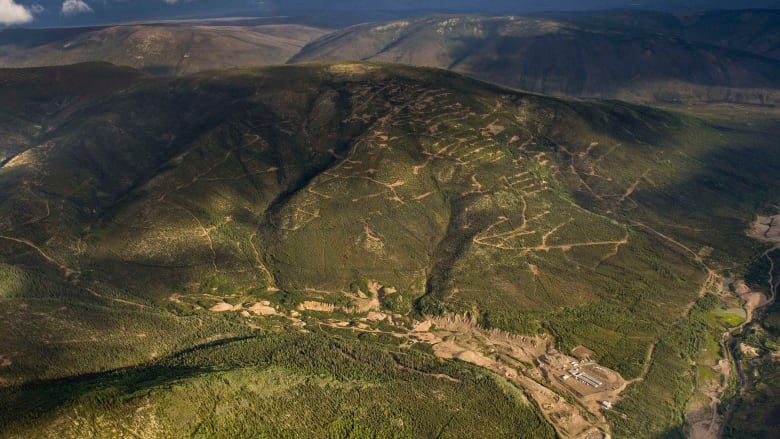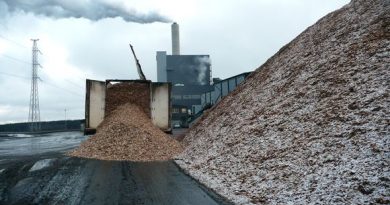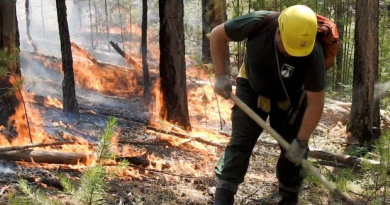Victoria Gold takes Yukon Water Board to court over $74M increase to mine security

Water board ordered company to post $104.9M in security after review, up from $30.7M
The Victoria Gold Corp. is taking the Yukon Water Board to court over an order for the company to pay an additional $74 million in security for its Eagle Gold mine, on top of the approximately $30.7 million the company has already posted.
Victoria Gold filed a petition to the Yukon Supreme Court on Monday, alleging that the board’s decision was unfair and asking that it be stayed pending appeal.
At the core of the legal action is a June 17 decision from the Yukon Water Board, an independent body responsible for water licences. Water licences are required for most mining operations and typically come with a number of conditions, which may include a requirement to provide a security cash deposit so that funds are available for clean-up and remediation efforts should anything go wrong.
Victoria Gold had previously posted just more than $30.7 million in security for its Eagle Gold mine, located in the Mayo, Yukon, area.
The Yukon Water Board, however, reviewed the company’s latest reclamation and closure plan from 2020 and rejected it due to a number of concerns, including Victoria Gold’s proposed water treatment processes and associated infrastructure as well as how the company calculated inflation. As a result, the board increased security for Eagle Gold to just more than $104.9 million, giving Victoria Gold 90 days to pay.
Victoria Gold, in its petition, claims the board’s decision was based on no or irrelevant evidence. It also alleges it wasn’t given a proper chance to respond to the board’s concerns, some of which it argues could have been easily addressed without increases to the security, and that the board hasn’t provided sufficient reasons for exactly how it calculated the new security.
Yukon Water Board Secretariat director Roger Lockwood confirmed to CBC News that the board was aware of the court petition but declined further comment, citing the fact that the matter was before the court.
Victoria Gold president and CEO John McConnell also declined an interview for the same reason.
Affidavit claims ‘decision does not appear to be based on any evidence’
In an affidavit, Hugh Coyle, Victoria Gold’s vice president of environment, wrote that the company had not expected the “sizeable increase” to its security, and that the water board had “given no previous indication that it was contemplating such an increase or on what basis an increase of this magnitude would be justified.”
“In some cases, the Water Board’s security decision does not appear to be based on any evidence that we know to have been before the Board,” Coyle wrote.
“In other cases, the Water Board’s security decision appears to take issue with evidence that has been unchanged for eight years, through two licence hearings, a technical pre-hearing conference and multiple reviews of the site’s [reclamation and closure plan].”
Coyle’s affidavit lists several examples of alleged unfairness, including a number of instances where he claims Victoria Gold could have easily addressed the board’s concerns with the reclamation and closure plan had the board communicated with the company prior to issuing its decision.
Those instances include the board increasing security by $2,035,185 to account for filling in a pond associated with a water treatment system, stating the proposed dimensions were too small; Coyle, in the affidavit, said the problem could be solved with “relatively minor engineering design.”
Coyle’s affidavit also notes that the water board’s security is significantly higher than the one determined by the Yukon government’s mineral resources branch during the same review — the branch arrived at a security of $68,662,300, about $36.6 million less than the board’s determination.
The mineral development branch, the affidavit adds, provided Victoria Gold with a memorandum from an external expert, a draft of its decision including an Excel spreadsheet with line items and calculations and an opportunity for the company to provide comment, which resulted in the branch adjusting the final security figure; the board did not.
Victoria Gold, the affidavit says, would incur approximately $1.2 million annually in carrying costs associated with the water board’s security, or about $400,000 to $500,000 more per year than the security determined by the mineral resources branch.
Case is ‘pretty rare and pretty unusual’
In an interview, Yukon Conservation Society (YCS) mining analyst Lewis Rifkind said it was “pretty rare and pretty unusual” for a mining company to escalate a dispute over a water board determination to the courts.
“Depending on which way the ruling goes from the Yukon Supreme Court, it could be precedent-setting,” he said.
While YCS made submissions during the water board’s review, Rifkind said it won’t be getting involved in the court case. He added the organization had been “quite pleased” with the increase to Victoria Gold’s security.
“[It’s] an amount we feel is in the ballpark to provide enough financial funds should things not work out at the mine site and the Yukon government has to take over and pay for remediation and closure,” he said.
“In the past, as I’m sure everyone is aware, there never seems to be enough security on mining projects and taxpayers have always had to step in and pay.”
Related stories from around the North:
Canada: N.W.T. gov’t agreed to sell its tungsten mining project — and could make $15M from it, CBC News
Finland: Miners hunting for metals to battery cars threaten Finland’s Sámi reindeer herders’ homeland, The Independent Barents Observer
Lapland: The Arctic Railway – Building a future or destroying a culture?, Eye on the Arctic
Norway: Significant metals discovery in key reindeer herding land in Norway, The Independent Barents Observer
Sweden: UN experts call on Sweden to halt mining project on Indigenous Sami land, Eye on the Arctic



